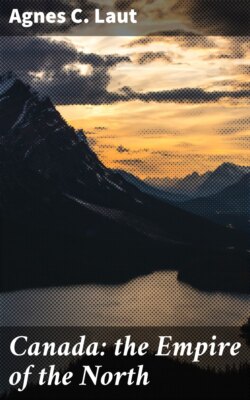Читать книгу Canada: the Empire of the North - Agnes C. Laut - Страница 22
На сайте Литреса книга снята с продажи.
FROM 1600 TO 1607
ОглавлениеTable of Contents
English voyages to North America—Sir Humphrey Gilbert—Henry Hudson—Champlain's first voyage—Founding of Ste. Croix—The colonists in Acadia
The second attempt to plant a French colony in the New World was more disastrous than the first.
Though my Lord Roberval fails, the French fishing vessels continue to bound over the billows of the Atlantic to the New World. By 1578 there are a hundred and fifty French fishing vessels off Newfoundland alone. The fishing folk engage in barter. Cartier's heirs ask for a monopoly of the fur trade in Canada, but the grant is so furiously opposed by the merchants of the coast towns that it is revoked until the Marquis de la Roche, who had been a page at the French court, again obtains monopoly, with many high-sounding titles as Governor, and the added obligation that he must colonize the new land. What with wars and court intrigue, it is 1598 before the Governor of Canada is ready to sail. Of his two hundred people taken from jails, all but sixty have obtained their freedom by paying a ransom. With these sixty La Roche follows the fishing fleet out to the Grand Banks, then rounds southwestward for milder clime, where he may winter his people.
Straight across the ship's course lies the famous sand bank, the graveyard of the Atlantic—what the old navigators called "the dreadful isle,"—Sable Island. The sea lies placid as glass between the crescent horns of the long, low reefs—thirty miles from horn to horn, with never a tree to break the swale of the grass waist-high.
The marquis lands his sixty colonists to fish for supplies, while he goes on with the crew to find place for settlement.
Barely has the topsail dipped over the watery sky before breakers begin to thunder on the sand reefs. Air and earth lash to fury. Sails are torn from the ship of the marquis. His masts go overboard, and the vessel is driven, helpless as a chip in a maelstrom, clear back to the ports of France. Here double misfortune awaits La Roche. His old patrons of the court are no longer powerful. He is thrown in prison by a rival baron.
In vain the colonists strain tired eyes for a sail at sea. Days become weeks, weeks months, summer autumn; and no boat came back. As winter gales assailed the sea, sending the sand drifting like spray, the convicts built themselves huts out of driftwood, and scooped beds for themselves in the earth like rabbit burrows. Of food there was plenty. The people had their fishing lines; and the stock, left by the Baron de Lery long ago, had multiplied and now overran the island. Wild fowl, too, teemed on the inland lake; and foxes, which must have drifted ashore on the ice float of spring, ran wild through the sedge.
Like Robinson Crusoe cast on a desert isle, the desperate people fought their fate. Traps were set for the foxes, snares for the birds, and scouts kept tramping from end to end of the island for sight of a sail. Racked with despair and anxiety, these outcasts of civilization soon fell to bitter quarreling. Traps were found rifled. Dead men lay beside the looted traps; and, doubtless, not a few men lost their lives in spring when the ice floes drifted down with the seal herds, and the men gave mad chase from ice pan to ice pan for seal pelts to make clothing. Spring wore to summer. The graves on the sand banks increased. For a second winter the dreary snowfall wrapped the island in a mantle white as death sheet. Then came the same weary monotony—the frenzied seal hunt over the blood-stained floes; the long summer days with the drone of the tide on the sand banks; the men mad with hope at sight of a sail peak over the far wave tops, only to be plunged in despair as the fisher boat passed too far for signal; the fading of the grasses to russet in the sad autumn light; then snowfall again—and despair.
Five years passed before La Roche could aid his people; and the pilot who went to their rescue won himself immortal contempt by robbing the castaways of their furs. Word of the rescue came to the ears of the court. Royalty commanded the refugees brought before the throne. Only twelve had survived, and these marched before the royal presence clothed in the skins of seals, hair unkempt, beards to mid-waist, "like river gods of yore," says the old record. The King was so touched that he commanded fifty crowns given to each man and the stolen furs restored. La Roche died of chagrin.
While France is trying to colonize Canada, England has not forgotten that John Cabot first coasted these northern shores and erected the English flag.
